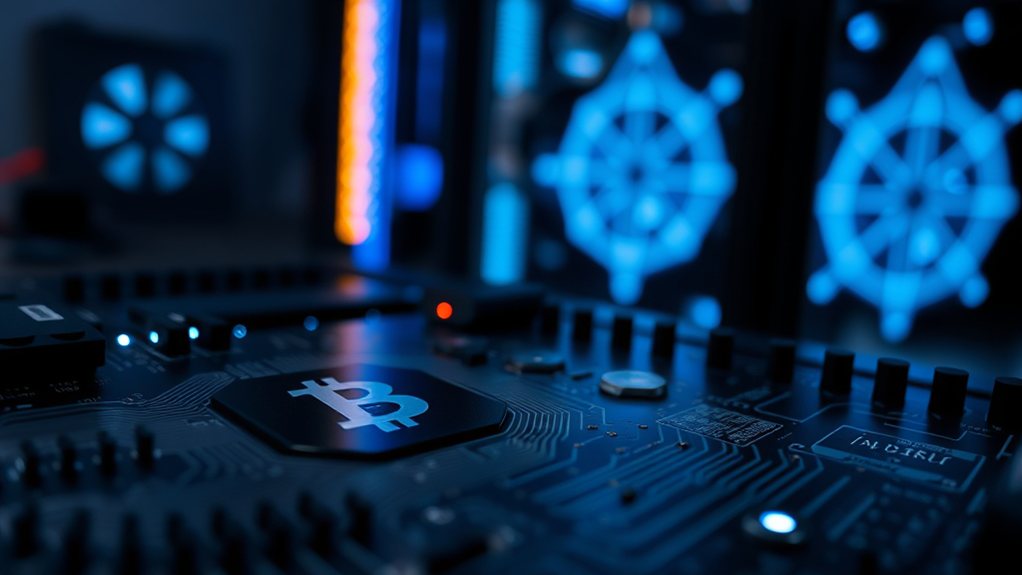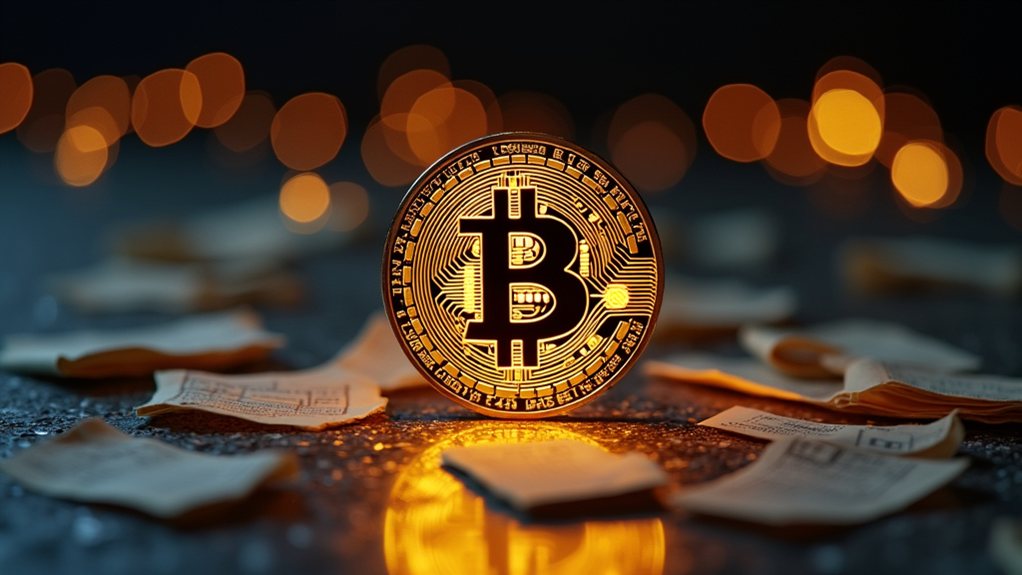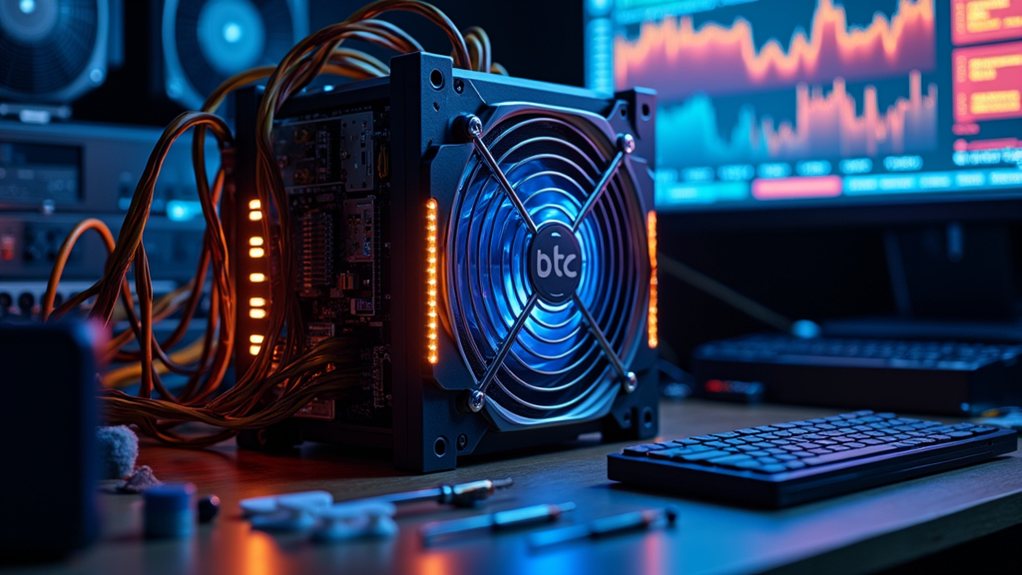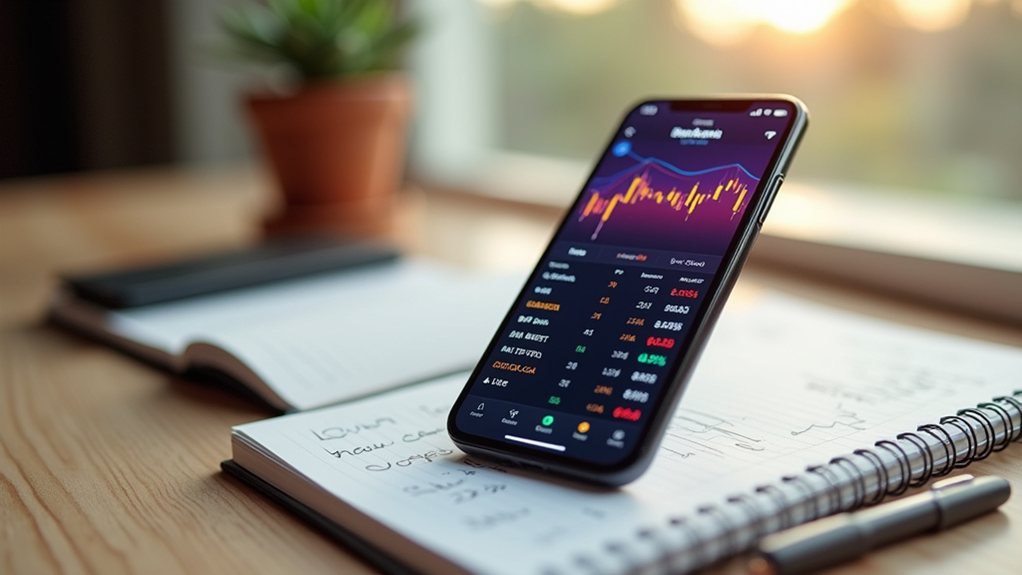Bitcoin emerged in 2008 when Satoshi Nakamoto published his revolutionary white paper during the financial crisis. The mysterious creator mined the genesis block on January 3, 2009, embedding a Times headline about bank bailouts. Building on cypherpunk concepts from Wei Dai and Nick Szabo, Bitcoin offered a decentralized alternative to traditional banking. No CEO, no headquarters—just code. By 2010, someone paid 10,000 Bitcoin for two pizzas. That's just the beginning of the story.

While the world reeled from the 2008 financial crisis, a mysterious figure known as Satoshi Nakamoto was putting the finishing touches on a revolutionary idea. On October 31, 2008, Nakamoto published a white paper titled "Bitcoin: A Peer-to-Peer Electronic Cash System" to a cryptography mailing list. The timing wasn't coincidental. As governments bailed out banks, Nakamoto proposed something radical: a decentralized currency that didn't need middlemen. No banks. No governments. Just math and code.
Bitcoin didn't appear out of thin air, though. It built on concepts developed by cypherpunks in the 1990s. These privacy advocates had been working on digital cash for years. Wei Dai's "b-money" and Nick Szabo's "bit gold" laid important groundwork in 1998. Adam Back's Hashcash from 1997 would later become part of Bitcoin's proof-of-work system. These early visionaries saw the need for privacy-enhanced transactions long before most people cared.
Bitcoin didn't emerge from a vacuum—it stands on the shoulders of cypherpunk giants who championed digital privacy when few were looking.
Nakamoto turned theory into reality on January 3, 2009. The first Bitcoin block—the genesis block—was mined. It contained a Times headline about bank bailouts. A statement, not just a technical achievement. Six days later, Bitcoin v0.1 hit SourceForge, and on January 12, computer scientist Hal Finney received the first Bitcoin transaction from Satoshi. These early moments were critical to establishing Bitcoin's legitimacy as a double-spending problem solution. Early adopters started mining using regular computers. Imagine that.
The first real-world transaction happened in May 2010. Someone paid 10,000 Bitcoin for two pizzas. Those pizzas would be worth millions today. Ouch. Exchanges started popping up—Bitcoin Market in March 2010, followed by Mt. Gox in July. By February 2011, Bitcoin reached parity with the US dollar. Not bad for internet money.
Technical improvements kept coming. Multi-signature transactions in 2012, SegWit in 2017, and the development of the Lightning Network starting in 2015. These updates made Bitcoin more useful, secure, and scalable. No small feat for a decentralized project.
Mainstream adoption followed slowly. WordPress started accepting Bitcoin in 2012. Coinbase launched the same year. The first Bitcoin ATM appeared in Vancouver in 2013. Even Microsoft jumped on board in 2014. Suddenly, Bitcoin wasn't just for nerds.
Regulators eventually took notice. FinCEN issued guidance in 2013. China banned financial institutions from handling Bitcoin that same year. New York introduced the controversial BitLicense in 2015. Japan took a different approach, recognizing Bitcoin as legal payment in 2017. The regulation dance continues today.
From cypherpunk dream to global phenomenon, Bitcoin emerged when trust in traditional systems was at its lowest. Thirteen years later, it's still here. No CEO. No headquarters. Just a network that keeps running, block by block. As competition increased, mining evolved dramatically from basic computers to specialized ASIC miners designed specifically for efficient hash calculations. Although Bitcoin exists only as digital code strings recorded on the blockchain, its impact on the financial world has been undeniably physical.
Frequently Asked Questions
Who Really Invented Bitcoin?
Bitcoin's inventor remains one of tech's greatest mysteries.
Satoshi Nakamoto published the whitepaper in 2008, then vanished in 2011. The true identity? Nobody knows for sure.
Dorian Nakamoto was falsely accused. Craig Wright claims he's Satoshi, but can't prove it.
Other candidates include Nick Szabo, Hal Finney, Adam Back, and Wei Dai.
Could've been a group effort. The mystery endures, probably forever.
Is Bitcoin Actually Secure?
Bitcoin's security is rock-solid on a protocol level.
SHA-256 encryption, proof-of-work consensus, and decentralized validation make it virtually unhackable.
No successful attacks on the core blockchain in 14 years. Pretty impressive.
The weak points? Humans.
Exchanges get hacked. People lose private keys. Scammers trick newcomers.
The technology itself holds up—it's the infrastructure around it and user practices that create vulnerabilities.
Can Governments Ban or Control Bitcoin?
Governments can try to ban Bitcoin, but complete suppression? Good luck with that.
Nations like China have outlawed it entirely, while others regulate exchanges and on-ramps. The crypto's decentralized design makes full control impossible.
Sure, they can regulate exchanges, monitor transactions, and implement KYC rules.
But properly stored Bitcoin in private wallets? Beyond government reach.
Bitcoin finds a way. Always has.
Why Does Bitcoin Use so Much Energy?
Bitcoin's energy consumption stems from its Proof-of-Work consensus mechanism.
Miners worldwide compete to solve complex puzzles, requiring massive computational power. It's like thousands of computers racing to win a math contest—24/7, non-stop.
The network deliberately makes mining difficult to guarantee security.
Result? Bitcoin uses as much electricity as entire countries.
Proponents argue it's justified for a global financial system. Critics call it an environmental disaster. Simple as that.
Will Bitcoin Ever Become an Official Global Currency?
Bitcoin becoming an official global currency? Unlikely.
Government central banks won't surrender monetary control that easily. Too volatile for everyday use. Plus, transaction speeds are painfully slow compared to Visa or Mastercard.
Sure, El Salvador took the plunge, but major economies aren't following suit.
Bitcoin will remain an alternative asset class, not your go-to money for groceries. The establishment isn't exactly rushing to upend the financial system.








